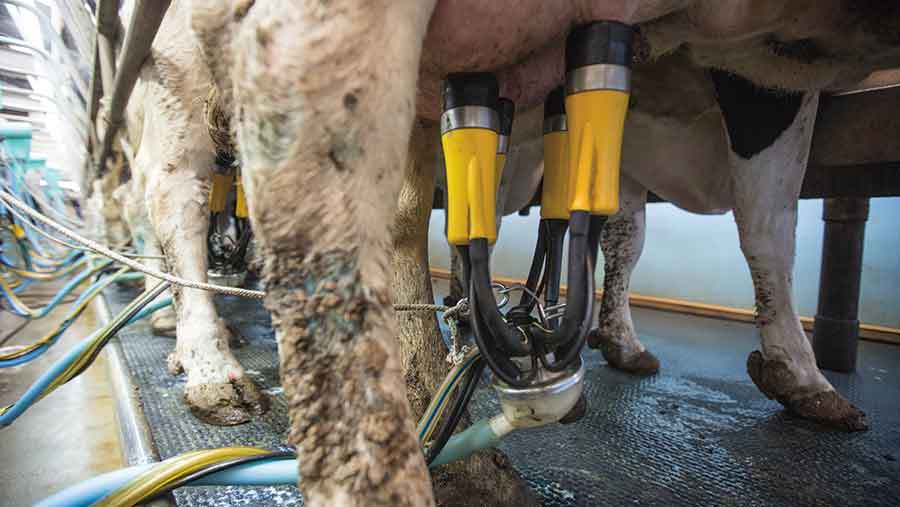How we can attract new entrants to dairy
Dairy can offer a fantastic career to new entrants but the industry needs to encourage and inspire the next generation to take up the opportunity.
Tony Evans, head of business consultancy as The Andersons Centre, examines how we can attract and keep new blood.

Tony Evans is head of business consultancy at The Andersons Centre.
The onus is on everyone in the dairy industry to inspire and encourage the next generation.
With up to 66 million customers on our doorstep who eat dairy products and one of the lowest costs of production in Europe, this can provide a great environment for a career in dairying.
If we produce 13bn litres per year at 650,000 litres per man we have 20,000 people working in dairying on farm.
With a career length of 45 years, this means we need 444 new entrants annually.
A good income often with accommodation available and a great country life environment to work in – what could be better?

© Tim Scrivener
There is a massive onus on all of us currently in the industry from the production, processing and support end to encourage the next generation by delivering of a vision that is positive, rewarding and enjoyable, but also business-led.
To achieve a flow of new entrants we need to:
- Inform
- Educate
- Encourage
Inform
On farm, and often in the farmhouse or farm office, include the next generation in discussing the opportunities and challenges.
This could be family or non-family (for example, employees or those who live away from the business).
Talk about the successes and discuss the lessons learned in running the dairy unit as a business that provides income which gives choices.
Off farm we need the processor and retailer extolling the benefits of our products, making them worthwhile to eat because of their natural nutritional values and the competitiveness of manufacturing them in the UK.
Educate
Dairying students need to be coached to the highest standards and levels of technical performance.
Combine this with sound education on profitable production systems and the ability to make good financial investments, and we would have an industry that can deliver on all measures of success, including money and enjoyment.
The challenge for our educational system is to see dairy farming as a joined-up business between excellent technical results – herd health, fertility and nutrition – and the ability to make sound business decisions through planning, budgeting and application, and an acceptable return on capital.
At present there are many colleges and universities with dairying as one of their courses of education.
But how many really demonstrate and teach financial success and preparation for a great career ahead?
Encourage
Discussion groups along with focused events on key skills required for success are great tools for knowledge advancement and for giving confidence to either change current practices or drive even better results from an existing business.
Entrepreneurs in Dairying is an annual series of workshops structured to provide commercial and financial skills to support youngsters already in dairying or those who want to enter.
Mentoring initiatives are also available to further provide support and encouragement.
Discussion groups need to be based on financial performance and delivering technical excellence by visits to and hearing from those that are “best in class”.
See also: Entrepreneurs in Dairying. Where are they now?
Such groups should not just be for dairy business owners, but must also include farm staff and the next generation.
New entrants entering the dairy industry need to move beyond formal education, even at a dairy-based college or university. They need to continue to gain knowledge and systems experience.
Future employers on farm must be prepared to coach and develop such talent.
There needs to be recognition and rewarding of success – not just financial, but in giving time to the successful dairy farmer and recognising this as an investment in both parties’ future.
Funding for the new entrant
The traditional bank manager assessment of any business proposition for borrowing is normally broken into three parts:
The borrowers balance sheet
If the new entrant has no “secure” assets (land or housing) the lender has limited capacity to lend or will charge a higher interest rate to cover the risk of non-payment.
The new entrant can borrow from third parties or specialist dairy lenders, who can provide funds at very competitive rates, for example Dairy Futures.
See also: Advice on setting up a dairy joint venture
Alternatively, the owner of the dairy farm could borrow the funds to invest by putting the farm up (all or part) as security against borrowing.
Track record
Showing that good technical and financial performance has already been delivered by the new entrant when working in another business before entering the industry in their own right is essential.
A realistic proposition
For going forward, it is essential the new entrant includes sensitivities to show what happens if key incomes (milk price) and key inputs (purchased feeds) alter upwards or downwards.
